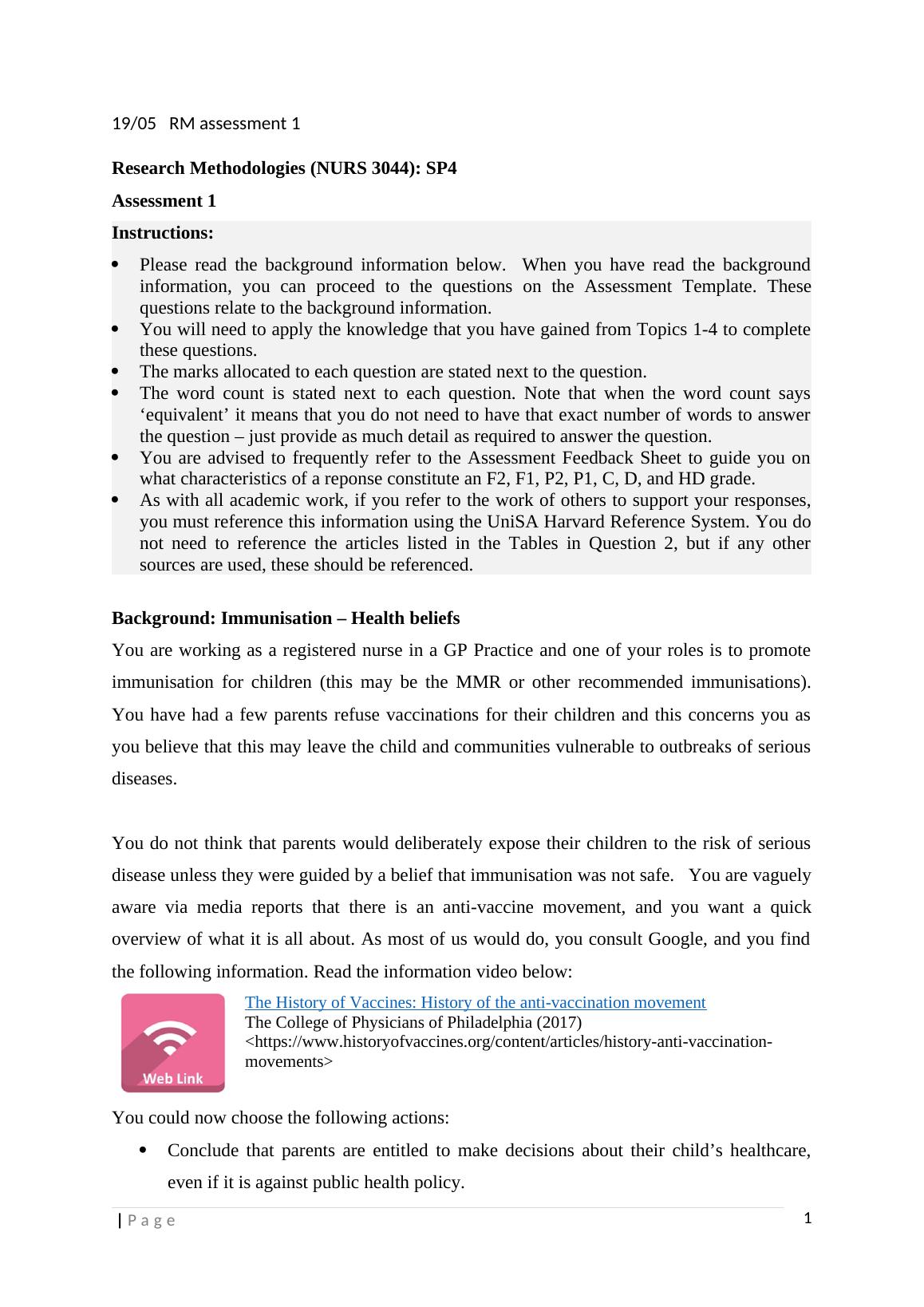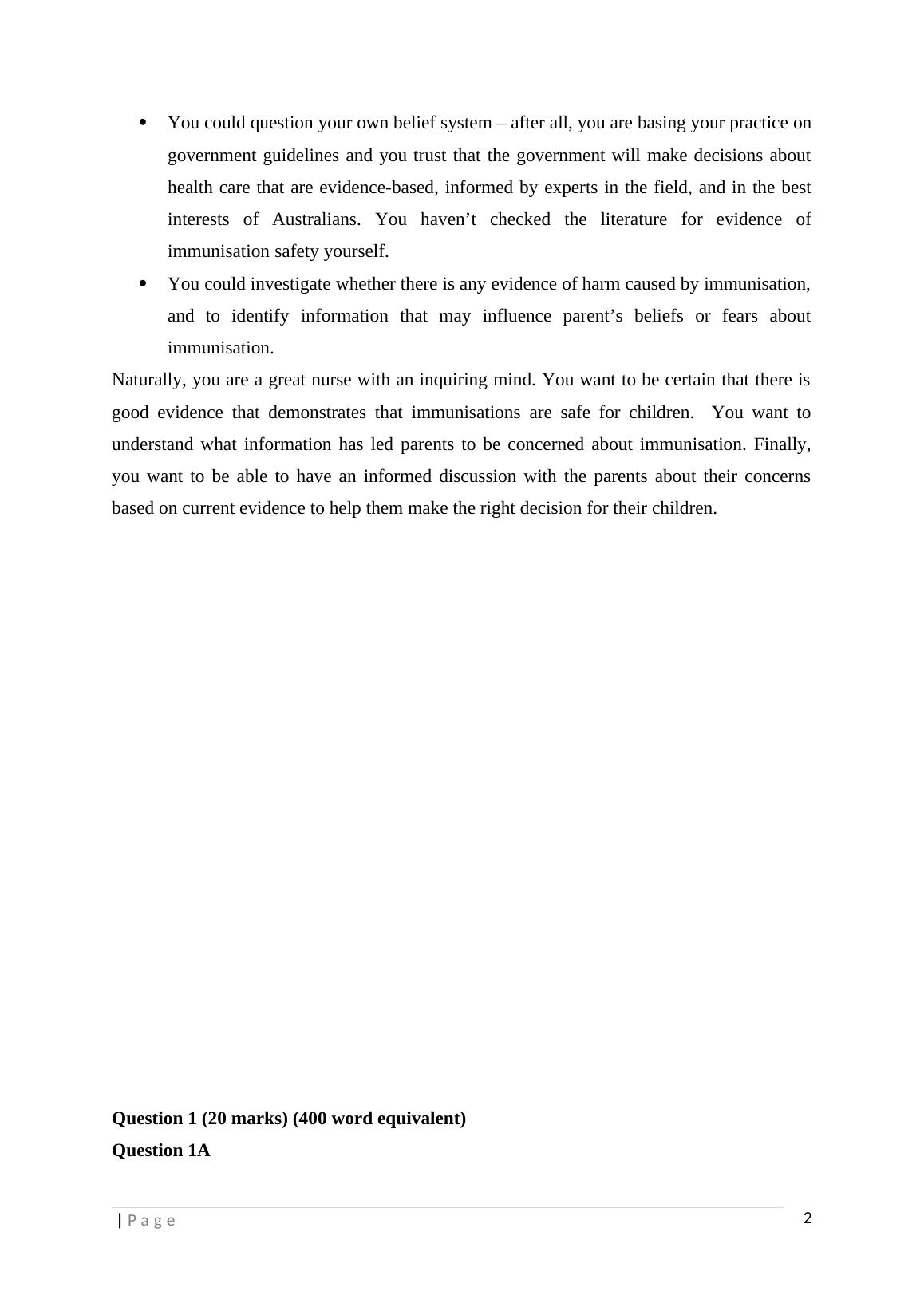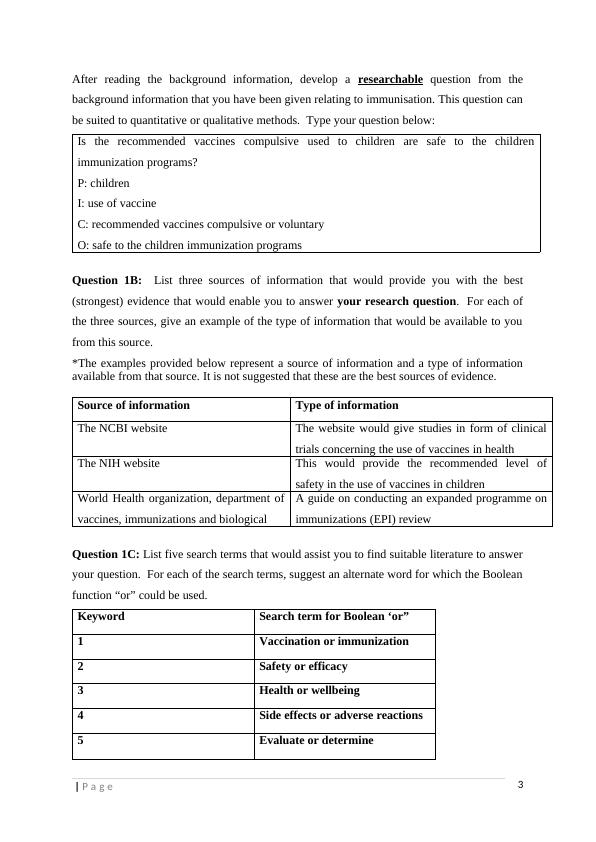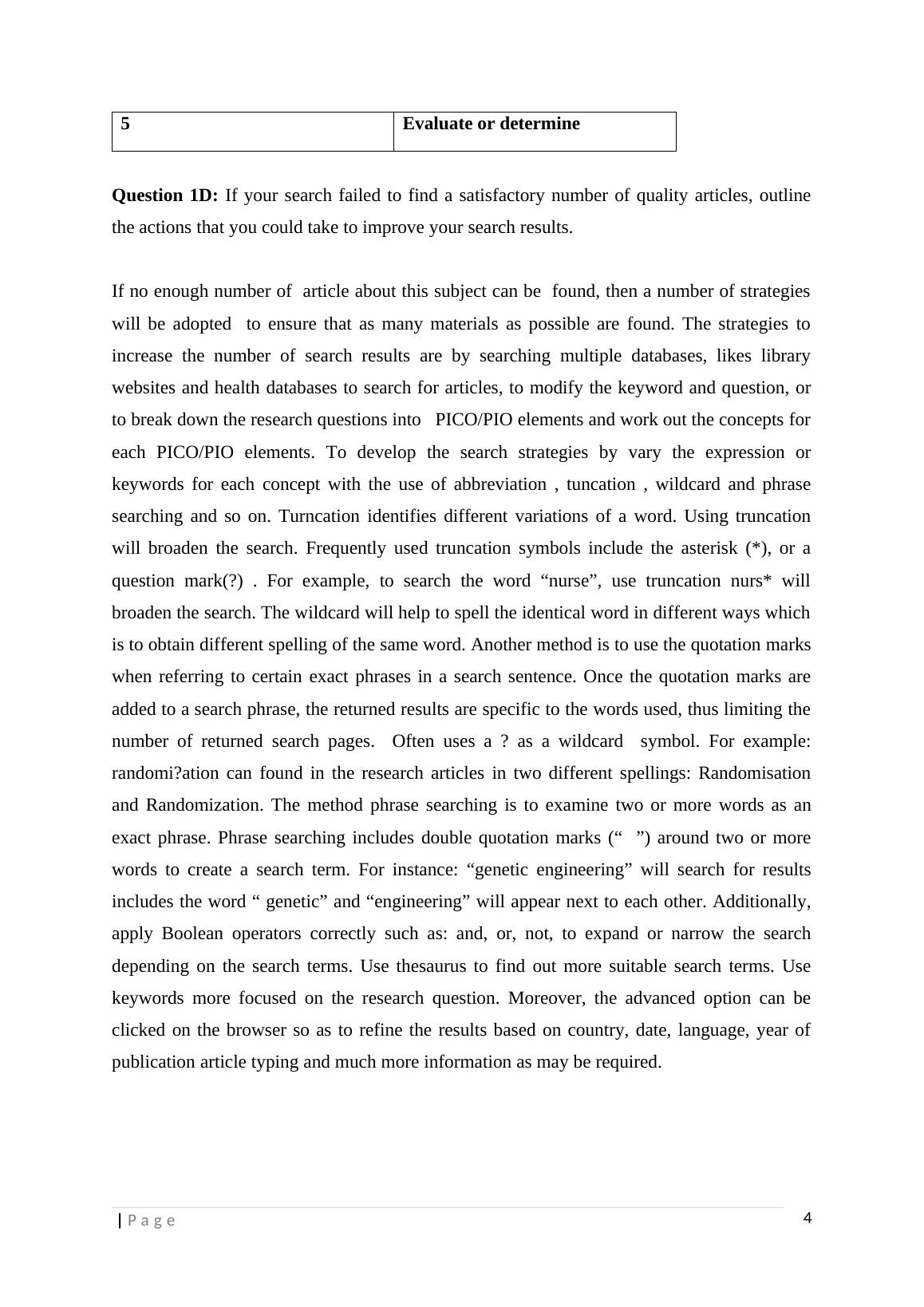Research Methodologies (NURS 3044)
Added on 2021-06-17
14 Pages4559 Words35 Views
19/05 RM assessment 1Research Methodologies (NURS 3044): SP4Assessment 1Instructions:Please read the background information below. When you have read the backgroundinformation, you can proceed to the questions on the Assessment Template. Thesequestions relate to the background information. You will need to apply the knowledge that you have gained from Topics 1-4 to completethese questions.The marks allocated to each question are stated next to the question.The word count is stated next to each question. Note that when the word count says‘equivalent’ it means that you do not need to have that exact number of words to answerthe question – just provide as much detail as required to answer the question. You are advised to frequently refer to the Assessment Feedback Sheet to guide you onwhat characteristics of a reponse constitute an F2, F1, P2, P1, C, D, and HD grade.As with all academic work, if you refer to the work of others to support your responses,you must reference this information using the UniSA Harvard Reference System. You donot need to reference the articles listed in the Tables in Question 2, but if any othersources are used, these should be referenced.Background: Immunisation – Health beliefsYou are working as a registered nurse in a GP Practice and one of your roles is to promoteimmunisation for children (this may be the MMR or other recommended immunisations).You have had a few parents refuse vaccinations for their children and this concerns you asyou believe that this may leave the child and communities vulnerable to outbreaks of seriousdiseases. You do not think that parents would deliberately expose their children to the risk of seriousdisease unless they were guided by a belief that immunisation was not safe. You are vaguelyaware via media reports that there is an anti-vaccine movement, and you want a quickoverview of what it is all about. As most of us would do, you consult Google, and you findthe following information. Read the information video below:The History of Vaccines: History of the anti-vaccination movementThe College of Physicians of Philadelphia (2017)<https://www.historyofvaccines.org/content/articles/history-anti-vaccination-movements>You could now choose the following actions:Conclude that parents are entitled to make decisions about their child’s healthcare,even if it is against public health policy. | P a g e1

You could question your own belief system – after all, you are basing your practice ongovernment guidelines and you trust that the government will make decisions abouthealth care that are evidence-based, informed by experts in the field, and in the bestinterests of Australians. You haven’t checked the literature for evidence ofimmunisation safety yourself. You could investigate whether there is any evidence of harm caused by immunisation,and to identify information that may influence parent’s beliefs or fears aboutimmunisation.Naturally, you are a great nurse with an inquiring mind. You want to be certain that there isgood evidence that demonstrates that immunisations are safe for children. You want tounderstand what information has led parents to be concerned about immunisation. Finally,you want to be able to have an informed discussion with the parents about their concernsbased on current evidence to help them make the right decision for their children.Question 1 (20 marks) (400 word equivalent)Question 1A | P a g e2

After reading the background information, develop a researchable question from thebackground information that you have been given relating to immunisation. This question canbe suited to quantitative or qualitative methods. Type your question below:Is the recommended vaccines compulsive used to children are safe to the childrenimmunization programs?P: childrenI: use of vaccineC: recommended vaccines compulsive or voluntaryO: safe to the children immunization programsQuestion 1B: List three sources of information that would provide you with the best(strongest) evidence that would enable you to answer your research question. For each ofthe three sources, give an example of the type of information that would be available to youfrom this source.*The examples provided below represent a source of information and a type of informationavailable from that source. It is not suggested that these are the best sources of evidence.Source of informationType of informationThe NCBI websiteThe website would give studies in form of clinicaltrials concerning the use of vaccines in healthThe NIH websiteThis would provide the recommended level ofsafety in the use of vaccines in children World Health organization, department ofvaccines, immunizations and biological A guide on conducting an expanded programme onimmunizations (EPI) reviewQuestion 1C: List five search terms that would assist you to find suitable literature to answeryour question. For each of the search terms, suggest an alternate word for which the Booleanfunction “or” could be used.KeywordSearch term for Boolean ‘or”1Vaccination or immunization 2Safety or efficacy3Health or wellbeing 4Side effects or adverse reactions5Evaluate or determine | P a g e3

Question 1D: If your search failed to find a satisfactory number of quality articles, outlinethe actions that you could take to improve your search results.If no enough number of article about this subject can be found, then a number of strategieswill be adopted to ensure that as many materials as possible are found. The strategies toincrease the number of search results are by searching multiple databases, likes librarywebsites and health databases to search for articles, to modify the keyword and question, orto break down the research questions into PICO/PIO elements and work out the concepts foreach PICO/PIO elements. To develop the search strategies by vary the expression orkeywords for each concept with the use of abbreviation , tuncation , wildcard and phrasesearching and so on. Turncation identifies different variations of a word. Using truncationwill broaden the search. Frequently used truncation symbols include the asterisk (*), or aquestion mark(?) . For example, to search the word “nurse”, use truncation nurs* willbroaden the search. The wildcard will help to spell the identical word in different ways whichis to obtain different spelling of the same word. Another method is to use the quotation markswhen referring to certain exact phrases in a search sentence. Once the quotation marks areadded to a search phrase, the returned results are specific to the words used, thus limiting thenumber of returned search pages. Often uses a ? as a wildcard symbol. For example:randomi?ation can found in the research articles in two different spellings: Randomisationand Randomization. The method phrase searching is to examine two or more words as anexact phrase. Phrase searching includes double quotation marks (“ ”) around two or morewords to create a search term. For instance: “genetic engineering” will search for resultsincludes the word “ genetic” and “engineering” will appear next to each other. Additionally,apply Boolean operators correctly such as: and, or, not, to expand or narrow the searchdepending on the search terms. Use thesaurus to find out more suitable search terms. Usekeywords more focused on the research question. Moreover, the advanced option can beclicked on the browser so as to refine the results based on country, date, language, year ofpublication article typing and much more information as may be required. | P a g e4

End of preview
Want to access all the pages? Upload your documents or become a member.
Related Documents
Immunisation and Health Beliefs: Assessment Templatelg...
|14
|5020
|109
Immunization Nursing Assignmentlg...
|12
|4554
|395
Immunisation and Health Beliefs: A Study on Educational Interventionslg...
|16
|5135
|342
Immunization –Health Beliefs | Assessment 1lg...
|12
|4208
|32
Assessment Templates for Nurse Practitionerslg...
|12
|3506
|142
Evidence of Immunisation Safetylg...
|12
|2803
|25
